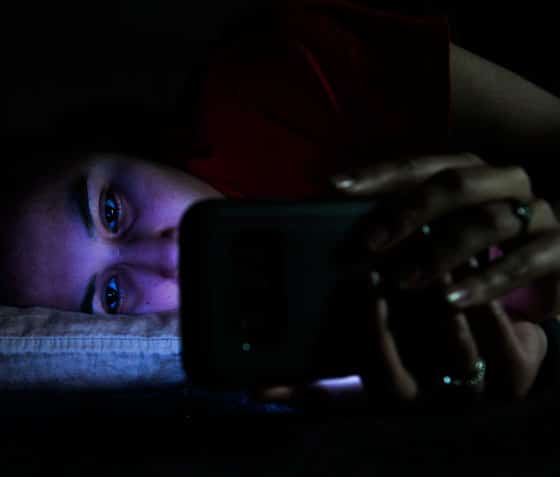Why Can’t This Kid Sleep? (Teen Edition)
- February 12, 2019
- The REACH Institute
- Child mental health Sleep disorders,

Alana, age 17, comes into your office complaining that she can’t sleep at night and struggles to stay awake during school. If she can, she sleeps until noon or later on weekends.
“Diagnosis of sleep disorders is often easier with teens than with younger children, as long as you ask the right questions,” said Robert Kowatch, MD, a REACH faculty member who is a pediatric sleep expert at Ohio State University Medical Center/Nationwide Children’s Hospital.
Unlike younger children (see previous newsletter), teens usually can tell you whether they snore or often wake up with dry mouth, which may indicate sleep apnea, or whether they experience restless leg symptoms.
“If we have an indication of a problem like apnea or restless legs, we’ll order a sleep study,” said Dr. Kowatch. “But most of the time we’re looking at simple insufficient sleep or chronic insomnia.”
Usually pediatric primary care providers (PCPs) can assess a sleep disorder — and devise a treatment plan — simply by asking the teen a series of questions.
- When do you usually go to bed? Where? With what electronic device?
- How long does it take you to fall asleep?
- How often do you wake up during the night? What do you do when you wake up?
- How late do you sleep on weekends?
- How much do you rely on caffeine (including energy drinks) to get you through the day? At what time do you stop?
The average adolescent needs 8 to 10 hours of sleep per night. Dr. Kowatch emphasizes that the optimum amount of sleep, for teens as for anyone, is “the amount that enables you to feel awake and rested the next day.”
Many sleepy adolescents simply go to sleep too late. If they “go to bed” at 10:30 but keep using their phone till 11:30 and then don’t fall asleep till midnight, they may get only 7 hours of sleep before the alarm goes off. Then it’s likely to take multiple alarms or nagging caregivers to get them out of bed.
On weekends, teens may sleep much later, trying to make up their sleep deficit. This ability to sleep late is one thing that differentiates insufficient sleep from insomnia.
“Sleep disturbance is also an indicator of possible depression,” noted Dr. Kowatch. Patients with depression frequently experience initial insomnia, though a minority may complain of sleeping too much.
Another issue to assess is any underlying anxiety, which can predispose a teen to chronic insomnia.
The Speilman model for the development of chronic insomnia depends on three factors:
- Predisposing factors such as anxiety make insomnia more likely but generally will not produce it alone.
- Precipitating factors are usually difficult events, from an upcoming test to a death in the family. Almost everyone loses a few nights’ sleep when life becomes difficult.
- Perpetuating factors combine with predisposing factors to turn loss of a few nights’ sleep into a chronic condition. For teens, common perpetuating factors are use of caffeine, daytime naps, and use of screens at night.
“We want to address all three factors one by one,” said Dr. Kowatch. Each can be treated with a combination of cognitive behavioral therapy for insomnia (CBTi) and sometimes medication for an anxiety disorder if present.
Good sleep hygiene is key. Many teens need help to develop good habits such as going to bed at the same time every night, giving up screens well before bedtime, and tapering off caffeine. CBTi can be extremely helpful.
“It’s great if a mental health professional is available for a course of CBTi,” said Dr. Kowatch. “If not, I recommend online programs and apps to help adolescent patients get to sleep.”
Resources for PCPs
Owens JA, Weiss MR. Insufficient sleep in adolescents: causes and consequences. Minerva Pediatr. 2017 Aug;69(4):326-336. doi:10.23736/S0026-4946.17.04914-3.
Spielman AJ, Caruso LS, Glovinsky PB. A behavioral perspective on insomnia treatment. Psychiatr Clin North Am. 1987 Dec;10(4):541-553.
Resources for patients
Online tools offer teens CBT to address insomnia or insufficient sleep.
- Sleepio is an evidence-based online CBT program, available for a fee.
Categories
- ADHD
- Anti-racism
- Anxiety
- Assessment & screening
- Autism
- Child mental health
- Coding
- Cognitive behavioral therapy
- College transition
- Culturally responsive
- Depression
- Eating disorders
- Foster care
- Grief
- High-risk children & youth
- LGBTQIA
- Medication
- Parents
- Patient communication
- Pediatric primary care
- School refusal
- Sleep disorders
- Suicide
- Trauma
- Show All Categories
Dates
Register for courses
“The training provided an interactive learning experience for a highly salient topic with limited community resources. The specific tools provided (for screening, treatment, and follow-up) and the network of providers are so valuable for sustaining this in practice.”
